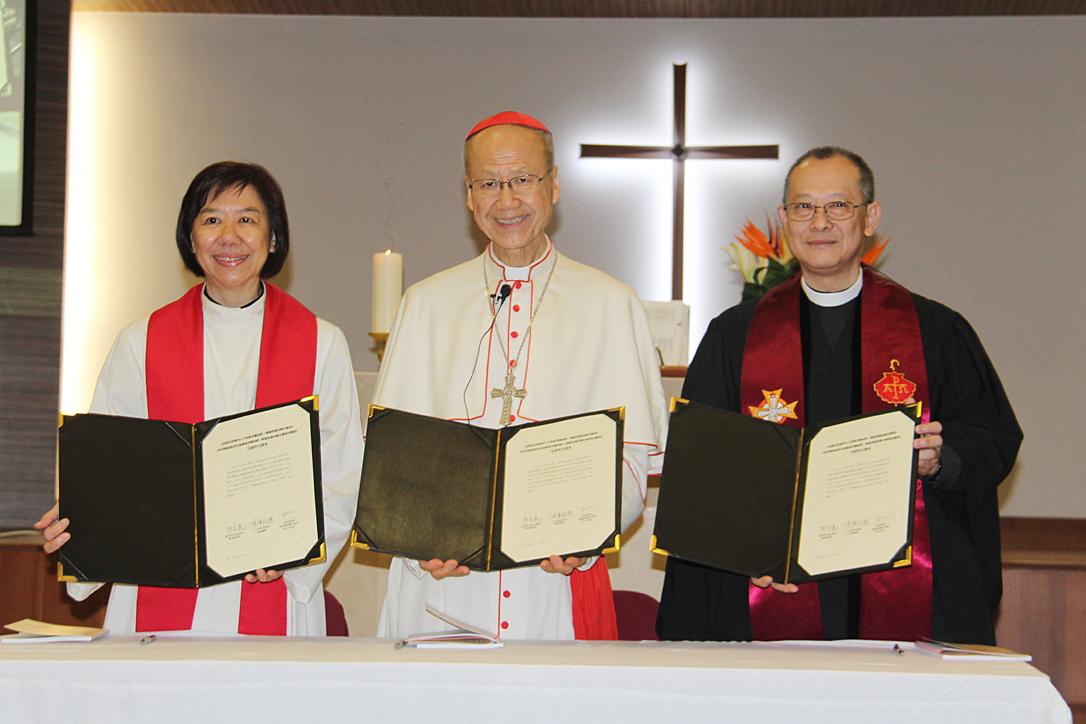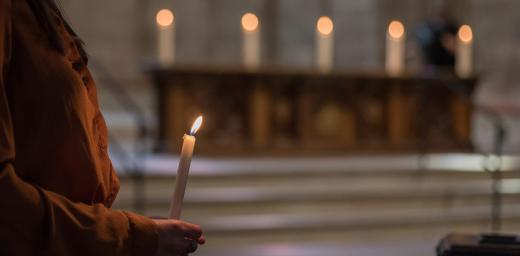Hong Kong: Ecumenical Translation of the Joint Declaration on the Doctrine of Justification

(l. to r.) Lutheran Bishop Jenny Chan, Catholic Cardinal John Tong, Methodist President Rev Tin-yau Yuen present the common Chinese JDDJ translation. Photo: Francis Wong
“Show that Unity Exists”
(LWI) – In spite of it being a document to bridge Catholic-Lutheran relations, the Joint Declaration on the Doctrine of Justification had two different Chinese translations: One by a Catholic, one by a Lutheran. Nearly 15 years after the signing of the document, Chinese speaking Christians have now received a new ecumenical translation which was ratified in a joint celebration of Lutherans, Catholics and Methodists on 25 May 2014 in Hong Kong.
In an interview Rev. Dr. Nicolas Tai, dean at the Theological Lutheran Seminary who also initiated the new translation, speaks about the different meanings of “justification” in Chinese and the power of Christians in Hong Kong.
You decided to translate the JDDJ into Chinese nearly 15 years after it was signed. How did that come to be?
There were already two translations. After the JDDJ was signed in 1999, I did a translation into Chinese, and Father Joy, my Catholic college, also translated the document. We thought there should only be a single translation, so we presented this proposal to the Catholic church, and the Bishop agreed. We then formed a group of 3 persons from the Lutheran and the Catholic churches respectively and used my version as a basis to form a common translation.
What was the difficulty in having a joint translation?
There were some language issues that also became a theological issue. The English word “justification” for example has two possible Chinese translations. You could translate them into either “proclaimed justification” – as I did in the Lutheran version – or “already completely justified” as a completed action, as did the Catholics. Of course it makes a difference which term you use. But now it is finished, and on 25 May we celebrated these joint efforts.
How are you going to celebrate?
15 Years ago, at the signing of the Declaration, we had a joint devotion. We could not call it a joint service since we do not share communion, but I am sure that something similar will be held this time.
How are Lutheran-Catholic relations in Hong Kong?
Under the umbrella of the Hong Kong Christian Council, Lutherans and Catholics have a very close relationship. As Lutherans we have always worked on that relationship. Each year there is an ecumenical co-workers service. The Catholics can’t join in the Eucharist, we have to accept that broken link, but we use the opportunity to show that unity still exists.
There is also the project of a united Bible translation. It was never realized due to a lack of money, but both churches are still making efforts. I think the Catholic translation is 80 years old, our Chinese translation was revised a bit more recently, but maybe I should once more talk to the cardinal about it! We engage in many practical things to make the churches come together. A common creed or use of Bible in a common language would probably bring us even closer.
What does the Lutheran message of justification mean in the context of the Asian work ethic?
I think humanism is most important, ethics and doing good deeds. Chinese know that even if they work and try to be good people, they are still not good before God. It is like Luther said: Am I ever enough? In Buddhist tradition they pray, they fast, they eat vegetarian, but still they can never be sure of the life to come. The concept of grace is the opposite of all human efforts in faith. Grace means that work is out of the scope. For many Chinese people, this is hard to accept.
Of course we are still very alike. As Protestant denominations we have been in dialogue with Taoists, Buddhists, Muslims and Confucianists for 30 years. Each year we have a topic we address, like market economy or violence in family. These are things that affect all religions, and the approaches are not very different. But as Christians, through grace we know how God helps us and motivates us. The other religions are lacking this power from outside.
Where are you going to distribute the translation?
The Catholic Church and we will put it up on our website, and it is also going to be distributed among the other Protestant denominations, especially the Methodists who also signed the JDDJ in 2006.
Is it possible to distribute it also in China?
I have many students from China who can take it back into their country, and I’ll also give it to church leaders in China. There is a freedom of religion, so it’s no problem. The government cracks down on Christians in other ways.
In Hong Kong, Lutheran and Catholic Christians also find themselves in a minority situation. According to recent numbers half of the population is atheist, and the predominant religions are Buddhism and Taoism. How do you as a church deal with that?
I think the percentage of atheists is even higher, probably around 90 percent - like in Europe. Many people call themselves Christians but they never go to church. As Luther said: A real Christian is always a minority. But in Hong Kong, Lutherans still have great influence which has to do with the history of colonialism. Back then, we were given the privilege to run schools, hospitals and work places, and the Christian influence is still very great. I think there are a lot of Christians in high government positions, the Christian churches are well represented. Hong Kong is almost like a Christian society. They are running good services, half of the education is in Christian hands. The concept of citizenship is very Christian. Christians may be a minority, but our influence is big.
Many members of the Lutheran churches in Hong Kong are younger than 30 years. What attracts young people to the congregations?
Theology certainly is not the point. Most youngsters became Christians because they have a positive attitude towards Christianity. Many of them attended Christian schools. Also, evangelization is common, it is a very strong and powerful witness. Friends bring their non-Christian friends to youth gatherings. A lot of young people become Christians because of their friends.




